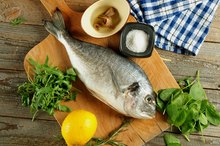What does fact checked mean?
At Healthfully, we strive to deliver objective content that is accurate and up-to-date. Our team periodically reviews articles in order to ensure content quality. The sources cited below consist of evidence from peer-reviewed journals, prominent medical organizations, academic associations, and government data.
- Food and Drug Administration: Guidance for Industry: A Food Labeling Guide (14. Appendix F: Calculate the Percent Daily Value for the Appropriate Nutrients)
- Linus Pauling Institute: Vitamin B12
The information contained on this site is for informational purposes only, and should not be used as a substitute for the advice of a professional health care provider. Please check with the appropriate physician regarding health questions and concerns. Although we strive to deliver accurate and up-to-date information, no guarantee to that effect is made.
Nutritional Value of Bluegills
Bluegills, or Lepomis macrochirus, are a type of sunfish that are naturally found in the Atlantic and the Mississippi River, according to Texas A&M University 1. These small fish, named for the blue tinge along the lower jaw and gill, are feed for larger farm-raised species fish. However, bluegills are nutritious, mild-tasting fish that you can feature in a variety of recipes.
Diet-Friendly Meals
A 3-ounce serving of cooked bluegills contains 97 calories, and bluegills are naturally free from carbohydrates. Bluegills are a good fit on low-calorie and low-carbohydrate diets for controlling your weight. Broil bluegills with lemon juice and garlic and serve them with steamed asparagus, or stir-fry the fish with mushrooms, green peppers, onions and tomatoes for a low-calorie and low-carbohydrate entrée. Broil or bake bluegills instead of breading and frying them to avoid adding calories and carbohydrates.
- A 3-ounce serving of cooked bluegills contains 97 calories, and bluegills are naturally free from carbohydrates.
- Broil bluegills with lemon juice and garlic and serve them with steamed asparagus, or stir-fry the fish with mushrooms, green peppers, onions and tomatoes for a low-calorie and low-carbohydrate entrée.
Lean Protein Source
Calories in Steamed Clams
Learn More
Each 3-ounce portion of cooked bluegills provides 21 grams of protein, or 42 percent of the daily value based on a 2,000-calorie diet, and less than 1 gram of total fat. Healthy muscles require protein, and protein is also essential for maintaining a strong immune system. Full-fat cheese and some meats, such as fatty beef, sausage and bacon, are among the top contributors to the unhealthy saturated fat content of the typical American diet. Lower your saturated fat consumption by choosing bluegills as a source of protein instead of fattier foods.
- Each 3-ounce portion of cooked bluegills provides 21 grams of protein, or 42 percent of the daily value based on a 2,000-calorie diet, and less than 1 gram of total fat.
- Full-fat cheese and some meats, such as fatty beef, sausage and bacon, are among the top contributors to the unhealthy saturated fat content of the typical American diet.
Healthy Blood Cells
A 3-ounce serving of bluegills supplies 1.3 milligrams of iron, or 7 percent of the daily value, and 2 micrograms of vitamin B-12, or 33 percent of the daily value. These nutrients are essential for producing healthy red blood cells. Iron is a mineral within hemoglobin, and vitamin B-12 is a vitamin whose presence is necessary for your body to synthesize hemoglobin. Vitamin B-12 is naturally present in only animal-derived foods, and the form of iron in animal-based foods, such as bluegill, is more easily absorbed than the iron in plant-based foods.
- A 3-ounce serving of bluegills supplies 1.3 milligrams of iron, or 7 percent of the daily value, and 2 micrograms of vitamin B-12, or 33 percent of the daily value.
- Vitamin B-12 is naturally present in only animal-derived foods, and the form of iron in animal-based foods, such as bluegill, is more easily absorbed than the iron in plant-based foods.
Cholesterol Content
Fish & Chicken Diet
Learn More
Cholesterol in a non-essential nutrient in animal-derived foods, such as seafood, meat, dairy products and eggs. A 3-ounce serving of cooked bluegills contains 73 milligrams of cholesterol. The 2010 Dietary Guidelines caution that consuming a high-cholesterol diet can contribute to higher levels of blood cholesterol and an increased risk of developing heart disease. Healthy adults should limit daily cholesterol consumption to a maximum of 300 milligrams. Dietary saturated fat content can have a greater effect on blood cholesterol levels than dietary cholesterol, so avoid using highly saturated fats, such as butter, to prepare the fish. Instead, use a small amount of olive or canola oil, which is low in saturated fat.
- Cholesterol in a non-essential nutrient in animal-derived foods, such as seafood, meat, dairy products and eggs.
- Dietary saturated fat content can have a greater effect on blood cholesterol levels than dietary cholesterol, so avoid using highly saturated fats, such as butter, to prepare the fish.
Related Articles
References
Writer Bio
Natalie Stein specializes in weight loss and sports nutrition. She is based in Los Angeles and is an assistant professor with the Program for Public Health at Michigan State University. Stein holds a master of science degree in nutrition and a master of public health degree from Michigan State University.








